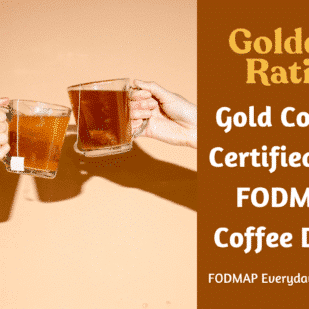Pre-workout beverages, protein shakes, protein, carbs…. What’s best to consume before a workout? And what won’t trigger irritable bowel syndrome (IBS) symptoms? This article is specifically about Pre-Workout Nutrition and the low FODMAP diet, as well as for those who are everyday athletes and gym-goers.
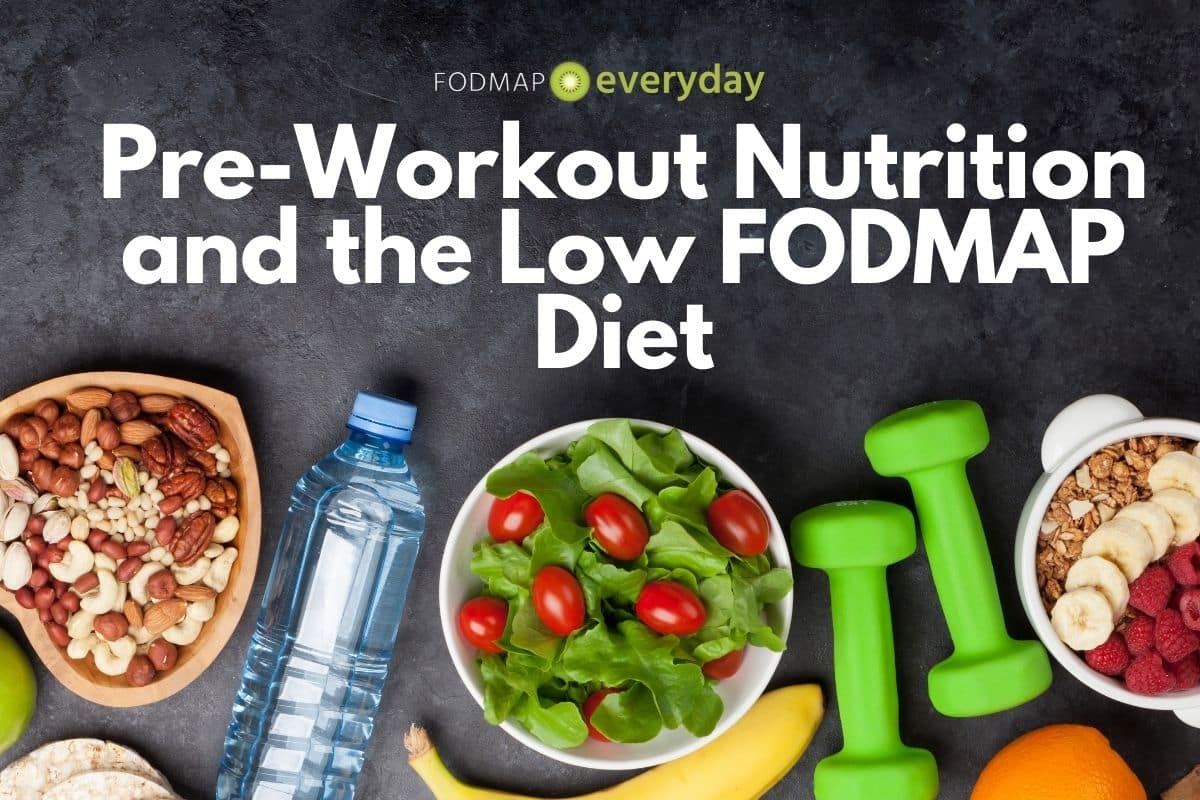
If you are an endurance athlete, please refer to our article How To Fuel When You Have IBS: All About Low FODMAP Sport Gels, Sport Drinks & Snacks.
Yes, we get it – pre-workout nutrition can feel a little daunting, with all the information online. Plus adding to that following a low FODMAP diet for your IBS adds an extra layer of complication. Well, if you’re an everyday athlete with a sensitive tummy looking to better support your training with nutrition, this post is for you!
For information on what to eat and drink after your workout, please refer to our article on Post-Workout Nutrition and the Low FODMAP Diet
- You Can Workout With IBS!
- Why It Is Important To Fuel Properly
- Recommended Nutrients For Fueling Up
- Timing Of Pre-Workout Nutrition: 2-3 Hours Before
- What To Eat 1 Hour Before Working Out
- What To Eat 30 Minutes Before Working Out
- Pre-Workout Hydration
- Pre-Workout Supplements & Caffeine
- One Approach Does Not Fit All
- The Takeaway
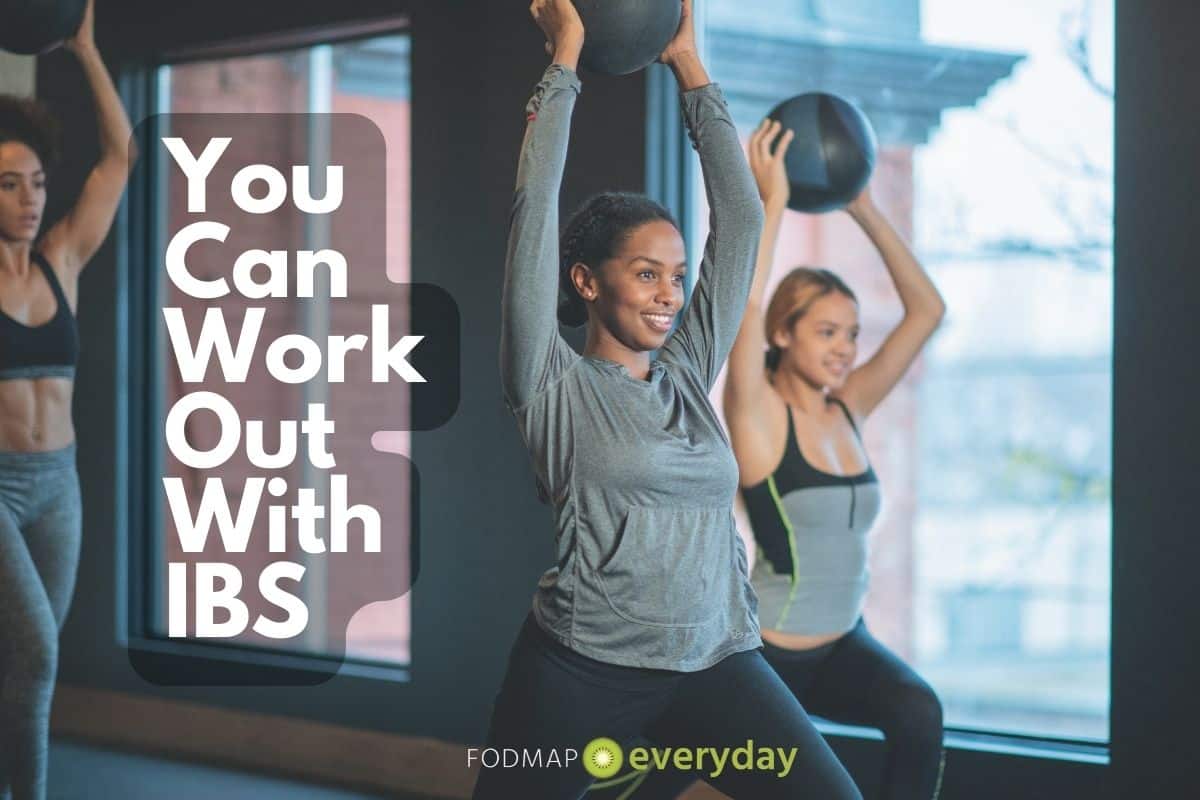
You Can Workout With IBS!
It is common for many with IBS to limit or cut their activities due to experiencing painful bloating, cramping and gas. However, our goal with this article today is to help you feel confident in fuelling yourself for your fitness activities – so that your gut feels good, and you have enough energy to get you through the session!
Exercise provides far reaching benefits which include supporting metabolic health, improving physical fitness, and general wellbeing. In addition, mild to moderate exercise can also help improve your gut-brain connection and stress management, as well as supporting proper gas clearance which can in turn help improve IBS symptoms (1, 2, 3).
So needless to say, there are lots of reasons why we DO want to keep active!
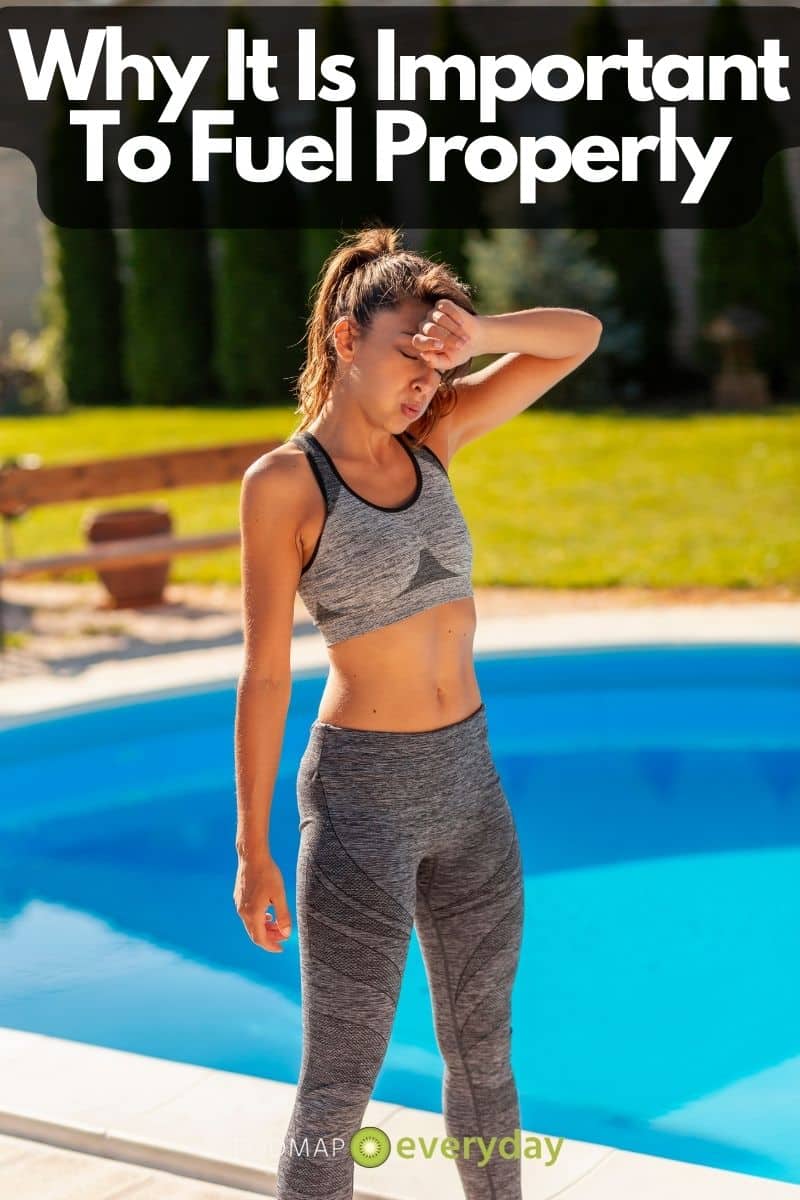
Why It Is Important To Fuel Properly
Following the basics of how to do it right, and also finding out what works best for you (and your gut!), can help you feel fueled and energized, rather than bogged down by your food. Understanding pre-workout nutrition is part of the picture.
When we feel good during exercise, we are SO much more likely to go back for more! Like James Clear said (he’s a behavior science expert) about the rules of building habits, “Make it Satisfying” – the key to building any habit, is to make it enjoyable! (4) So making sure you’re well fuelled and your gut is happy can definitely improve your chances of having an enjoyable training session and keep you motivated to come back for more.
Having enough fuel in your system also helps prevent the chance of injury by reducing the risk of hunger and low blood sugar during your session. Low blood sugar can impact energy and concentration. Not to mention, blood sugar fluctuations can trigger gut symptoms.
Finally, your pre-workout fuel supports the activity of your muscles and brain, so you are able to push harder and for longer. Of course, this helps support training adaptations so we can see better recovery and more progress from our training session (ie. become faster, stronger and more agile with time) – because isn’t that the goal?
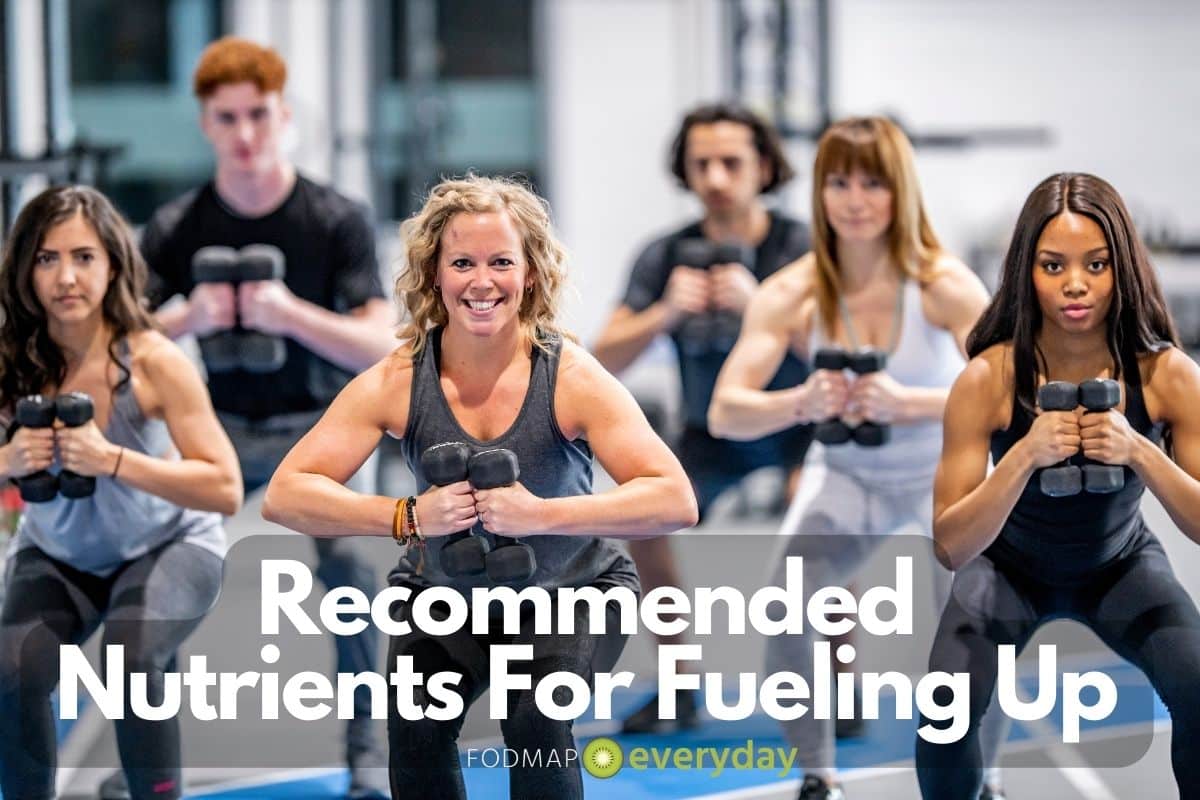
Recommended Nutrients For Fueling Up
A combination of carbohydrates and protein is recommended for any fuel close to a workout, sporting event or other physical activity as these nutrients provide fuel for our muscles and brain (5). In addition, we want to keep this fuel lower in fat and fiber to prevent gut discomfort.
A combination of carbohydrates and protein is recommended for any fuel close to a workout, sporting event or other physical activity as these nutrients provide fuel for our muscles and brain.
But, like most areas in nutrition, there is some nuance when it comes to pre-workout fuel recommendations. The amount of time between when you eat and when you do train may slightly affect the composition of your meal or snack. In addition, the time that you choose to eat before will depend on your individual schedule (which may change each day), as well as what is convenient for you.
Let’s break down what’s recommended to eat for pre-Workout nutrition, depending on when you fuel up. For more specificity on amounts of foods, where we have not dictated, please refer to your Monash University smartphone app and your FODMAP Friendly smartphone app.
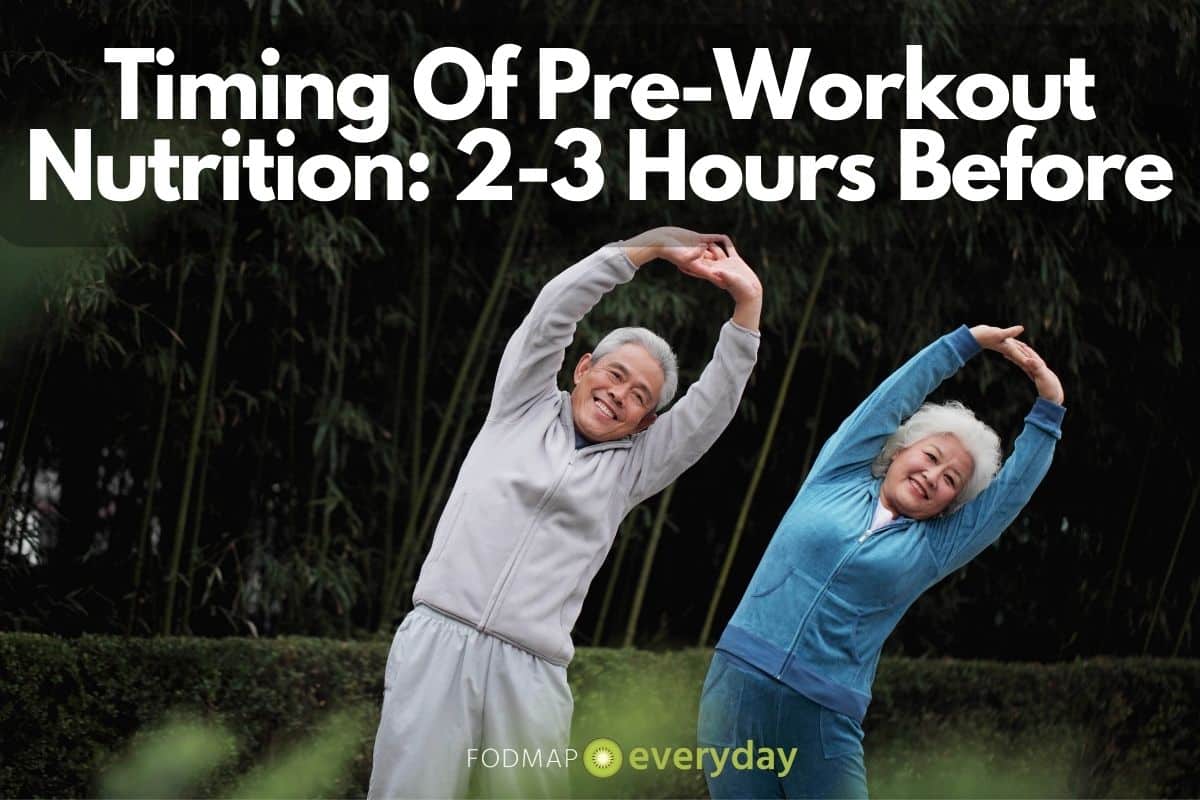
Timing Of Pre-Workout Nutrition: 2-3 Hours Before
Eating 2 to 3 hours before your workout is usually the best time frame for most individuals, to allow enough of a window for your body to digest food and top up its energy stores. A meal that contains carbs, protein, and healthy fats is best at this time to help support your training.
This meal should include:
- Complex carbs: Carbs provide you with energy and fuel to support your muscles during the activity. Include complex carbohydrates like starchy vegetables and whole grains to provide longer lasting energy as this meal is farther from your training. Examples include quinoa, brown rice, potatoes and squashes. However, avoid having too much fiber, like a lot of raw vegetables and fruits with skins, which are slower to digest and may cause some discomfort during your workout.
- Lean/moderate fat protein: Protein before workouts is very important to supply your body with amino acids to help promote muscle protein synthesis during your training as well as keep your blood sugar stable in order to maintain stable energy levels and concentration (6). Examples include firm tofu, tempeh, eggs, fish, chicken, turkey, greek yogurt and lactose-free cottage cheese (low FODMAP amounts, of course).
- Healthy fat: Fat slows the digestion of food so eat some healthy fats to help support a steady stream of energy, but keep it moderate (under 25 g) to prevent slowing gut motility and feeling too heavy for your training. Aim for 1 tablespoon of added fats such as oil, dressings and butter in this meal.
Low FODMAP examples:
- Ground turkey with roasted potatoes, spinach & ¾ cup (75g) steamed broccoli heads
- Rolled oatmeal with 5 medium strawberries (65g), 1 medium firm banana, 1 tablespoon (15g) pumpkin seed butter, & lactose-free Greek yogurt (1-2% M.F.)
- 2-3 whole large eggs on sourdough toast with bowl of sliced fruit (1 navel orange & 2 small kiwi [150g])
You May Be Interested in Reading: How To Carb Load While Following the Low FODMAP Diet
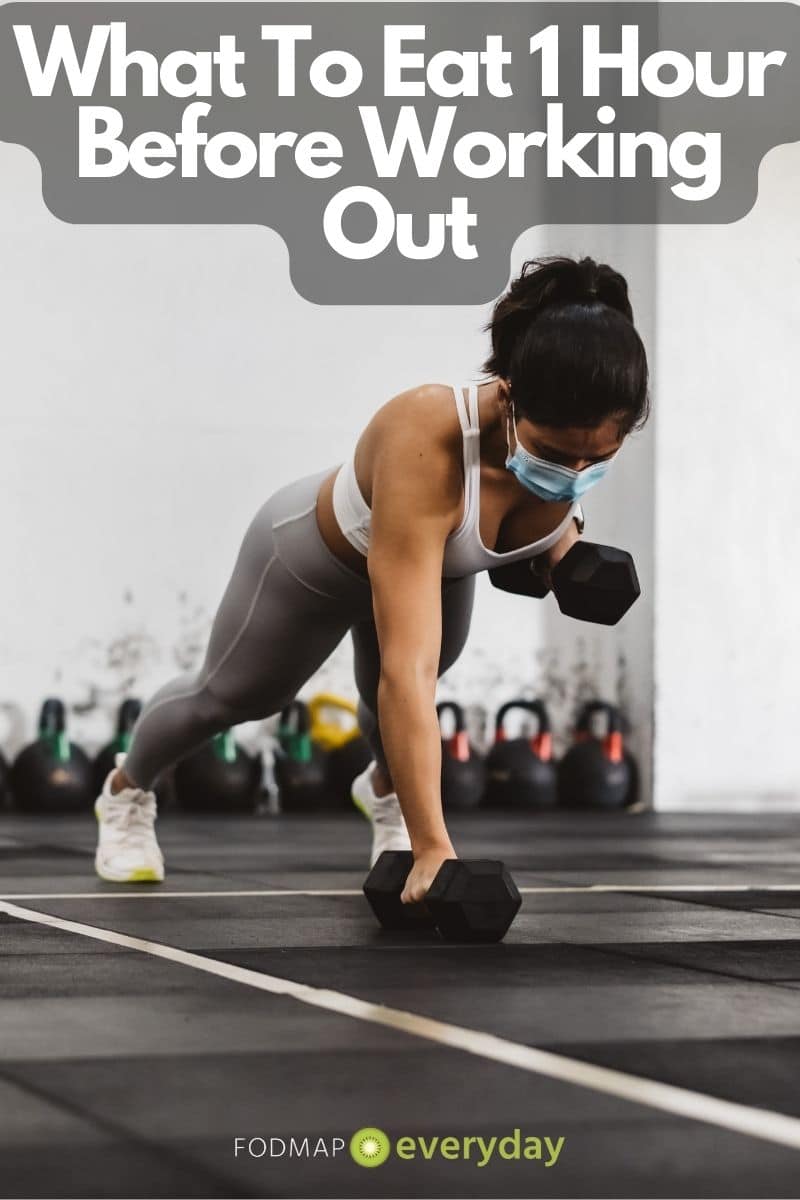
What To Eat 1 Hour Before Working Out
Depending on when you train, you may not have 2-3 hours before your workout and that’s just fine. When eating closer to your workout, choose a smaller sized meal/snack to prevent you from feeling too full during your activity, but still give you the fuel you need.
This snack should include:
- Easy digesting carbs: aka lower fiber carb sources like bananas, grapes, starchy vegetables (sweet potato, potato, plantain, butternut squash) and crackers/ breads/ cereals
- Lean protein: Such as egg whites, firm tofu, soy milk made from soy protein isolate, low FODMAP protein powder and chicken breast
- Fats: Keep them low (less than 10g total), focus on carbs and protein rich foods as the stars of this meal.
Low FODMAP examples:
- Scrambled egg whites with sourdough or low FODMAP gluten-free toast topped with 1 teaspoon (7g) almond butter
- Cooked quinoa (½ cup) topped with ¾ cup lactose-free Greek yogurt (1-2% fat) with ½ medium firm banana, handful raspberries (60 g max) and 1 teaspoon (5g) tahini or sunflower seed butter
- Low FODMAP protein powder blended with almond milk,½ medium firm banana, 1 tbsp maple syrup, 1 teaspoon (8g) natural peanut butter & ¼ cup (40 g) fresh blueberries
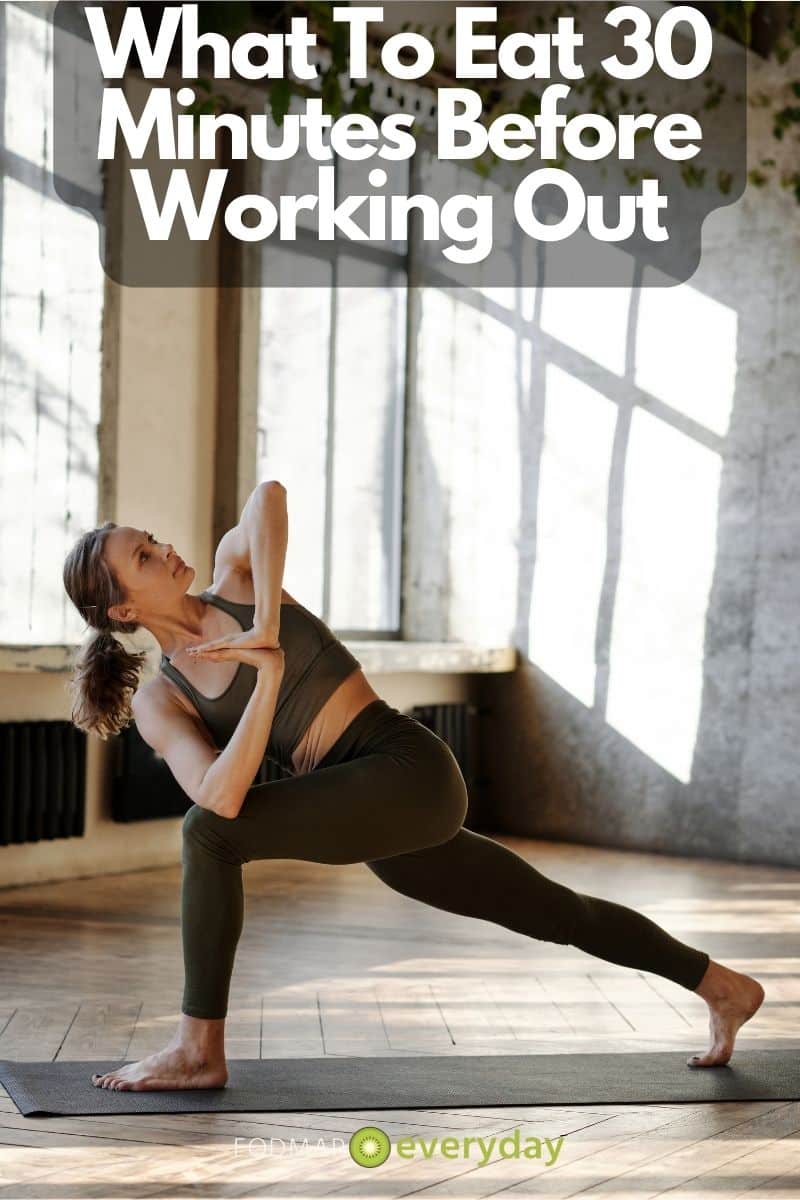
What To Eat 30 Minutes Before Working Out
Eating earlier is optimal to allow enough time to digest your food. However, if you’re not able to (for example, if you’re working out early in the morning, or you were stuck in a work meeting that ran late), you might need something quick digesting to help raise your blood sugars and provide energy.
This snack should include:
Quick digesting (aka high glycemic) carbs: White rice, bananas, rice cakes, maple syrup, energy gels, and juice (we have an article for you on low FODMAP energy gels and beverages).
Protein: Now is a great time to utilize a protein powder due to very limited time to digest, such as collagen, brown rice or pea protein isolate (I love Nuzest protein – although not yet lab tested, it uses a protein called Thaumatin as the sweetener, and contains highly concentrated pea protein isolate, with 0 grams sugars per serving, so we can assume it is likely low FODMAP. For more options, we also have an article for you on low FODMAP protein powders in general).
Low/No Fat: Like the other meal times, fat should be limited (5g or less) and especially in this meal as you want nutrients to be used as quickly as possible.
Low FODMAP examples:
- Protein shake (collagen, brown rice, or pea protein isolate based) + firm banana
- Lactose-free cottage cheese + maple syrup
- 1 cup (240 ml) cranberry juice + egg whites
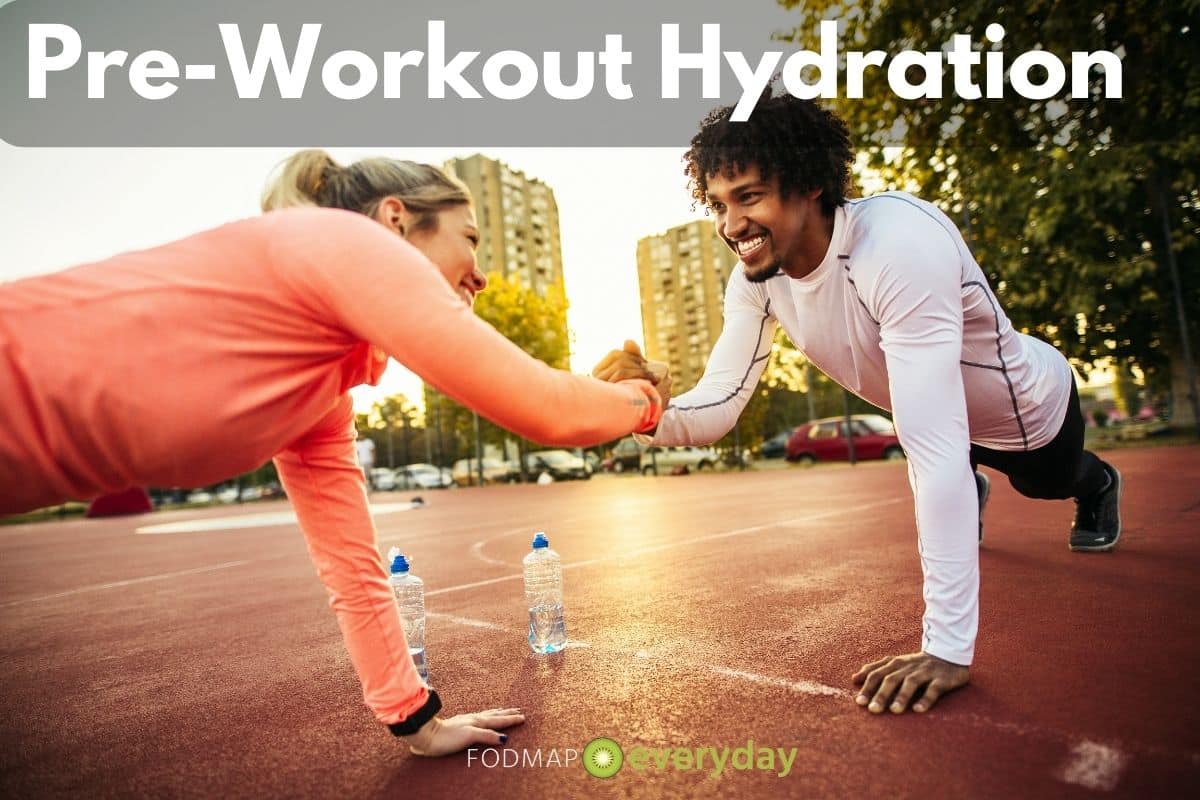
Pre-Workout Hydration
Pre-workout nutrition includes beverages. Hydration is incredibly important – not only for your digestive system, but for your exercise performance as well! Did you know that dehydration can increase your perception of effort? This means exercise can feel harder if you aren’t well hydrated, and mask symptoms of low energy and fatigue.
So what should you drink pre-workout? Well, if you are an everyday athlete not going on extensive training sessions, hydrating well with water and other gut-friendly fluids should be just fine.
How much water should you be having on a daily basis?
While this can depend on individual factors, aim to have roughly 1L of fluids per every 50 pounds of body weight. Add an extra 500ml per every 30-minutes of activity you do. If you aren’t sure about your specific targets and/or if you are getting enough, speak to a Registered Dietitian.
Electrolytes
Making sure to consume adequate amounts of electrolytes is important to help your body properly use and maintain fluid balance. The main electrolytes include sodium, potassium and magnesium. Oftentimes, potassium and magnesium intake can be lower on a low FODMAP diet as these nutrients are mainly found in plant-based foods (which naturally are higher in fermented sugars, aka FODMAPs).
Some tips to ensure you are getting enough electrolytes in your diet:
Sodium: If you cook a lot of your meals at home, make sure to sprinkle some salt in your recipes to ensure adequate sodium intake.
Magnesium: Including portions of plant-based foods like nuts, low FODMAP portions chickpeas and lentils, dark leafy greens, dark chocolate, firm tofu, tempeh and edamame can help ensure enough magnesium intake.
Potassium: Consuming foods like pulses, tomatoes, potatoes, lactose-free dairy products can help support our potassium intake.
Do you need a supplement? You will likely not need an electrolyte supplement before or during your workout if you are training less than 1-hour at moderate intensity, or less than 30-45 minutes at moderate-higher intensity in moderate temperatures. However, if you are a heavy sweater and/or training at higher intensities and in higher heat, you may benefit from an electrolyte supplement. Some low FODMAP friendly options we recommend include:
- Vega Sport Hydrator: Note: This product has not been tested in lab for FODMAP content. However it contains 0 grams of sugars per serving and although it contains beet root powder which is high FODMAP, this is far down the list in terms of ingredients so based on the product serving size (3.6g) we can assume it should be tolerated by those with IBS. However, always assess your own tolerance level with untested products.
- LMNT Electrolyte Powder
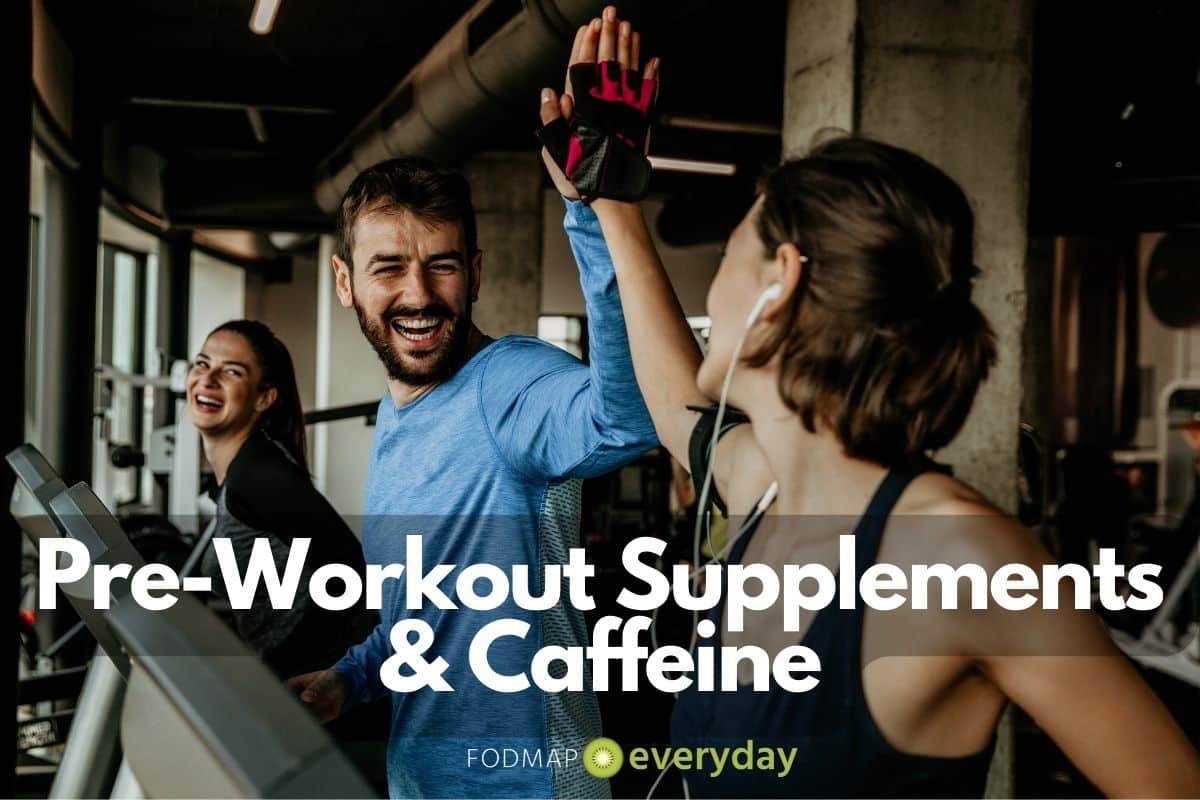
Pre-Workout Supplements & Caffeine
Some gym-goers use ‘pre-workout supplements’ which are essentially a cocktail of stimulants like caffeine and sweeteners that can help to ‘hype you up’ and give you an extra boost for your workout. However, these supplements can also trigger some gut irritation.
Please read our article, IBS, The Low FODMAP Diet, Coffee & Coffee Drinks.
Caffeine (ie. that powerful stimulant in coffee and green tea) has been shown to give exercise performance boosts (7). While we can become desensitized to the effects of caffeine with regular consumption, if you are training earlier in the day, you may benefit from having your coffee or tea around an hour before your activities to help time the energy boost.
It’s recommended to avoid caffeine later in the day to help support your sleep hygiene – which is crucial for your digestive health, as well as your exercise training and muscle recovery.
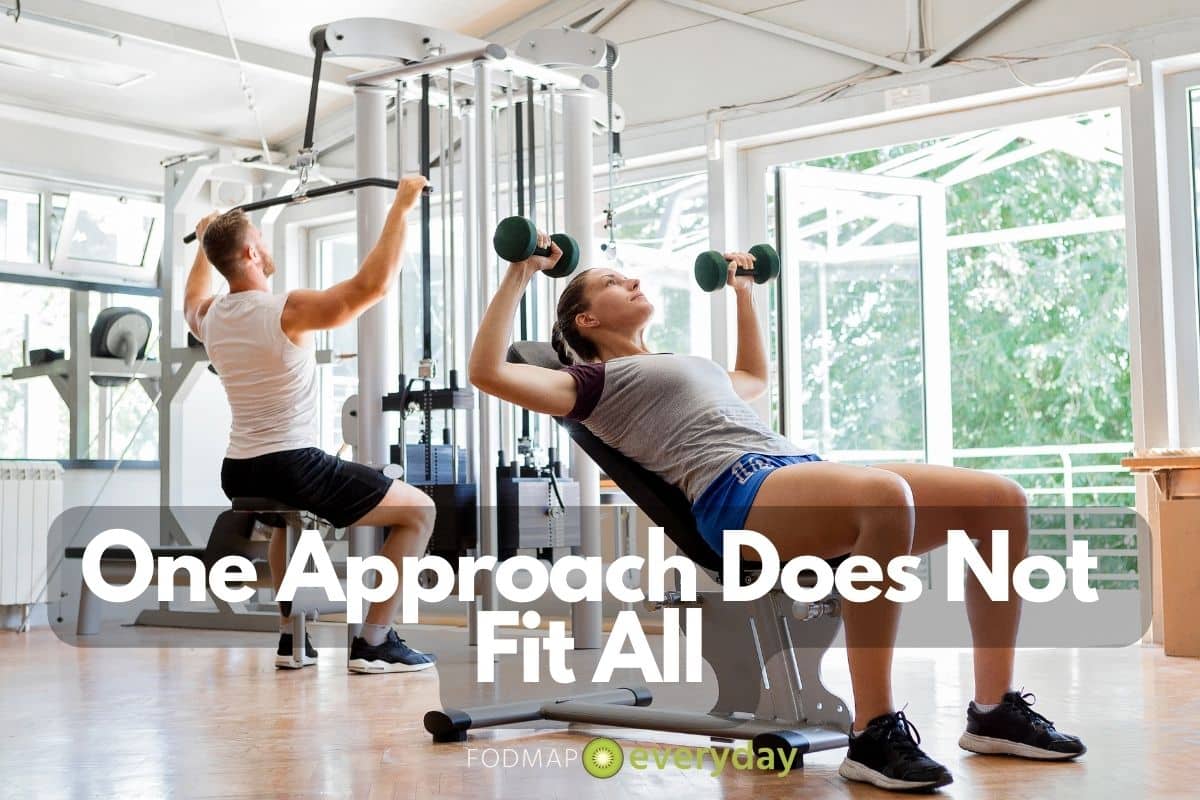
One Approach Does Not Fit All
You might find that depending on the type of activity and intensity you engage in, different volumes and combinations of food might feel better than others. For example, if you are doing strength training/bodybuilding, you may get away with having a larger sized snack or meal closer to your workout as your training tends to be more stationary.
If you primarily do high intensity interval training (HIIT), or running, then your workouts involve a lot more moving and bouncing around so you would likely benefit from feeling lighter and having more time to digest prior to your training.
In addition, as we all have individual needs, it is best to try out eating at different times with different food combinations, and learn more about what feels best for your body. Some people may be okay eating a little closer to a workout, and others need more time before their session.
However, make sure to try the above strategies on food combinations to help guide what to include in your meals or snacks before your workouts to help minimize the chances of gut discomfort and support your training. But remember that no one size fits all!
More Support
As always, reach out to a registered dietitian for support with fuelling your performance as well as managing IBS. Check out our Global Registered Dietitian Directory.
Ready to fuel your workouts and sports performance, while keeping IBS and gut symptoms at bay with the right tools and strategies? My Pre & Post Workout Nutrition For a Happy Gut: Mini Course & Resource Bundle might be the next step for you! Use code FODMAPEVERYDAY for 15% off the usual price.
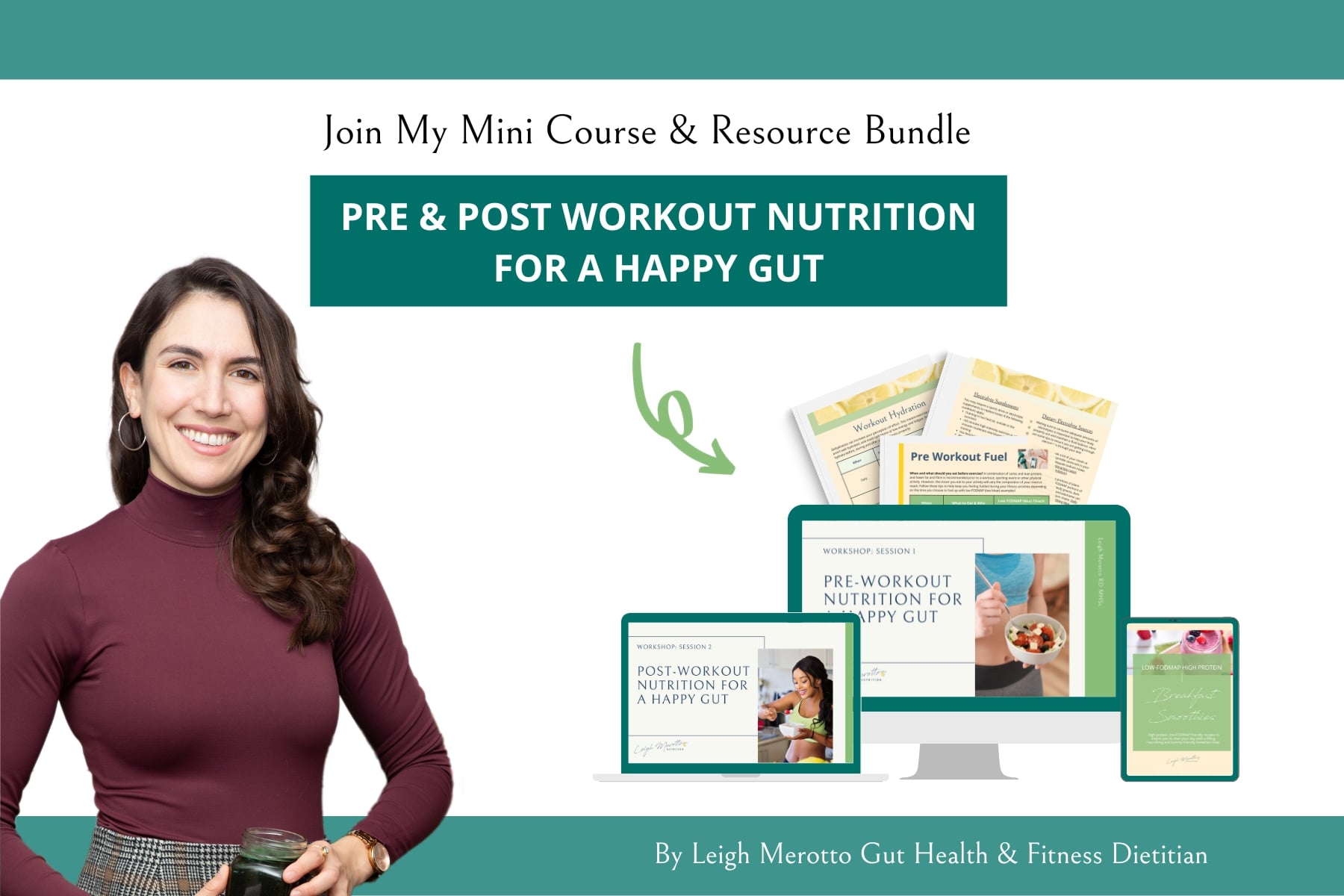
The Takeaway
As you can see, pre-workout nutrition is incredibly important, and can help to improve your performance during your training, as well as keep you motivated to come back for more! Give these recommendations a try, and as mentioned, see what works best for you and the timing of your meals depending on your schedule and workout styles. Let us know how it goes in the comments below.
You might also want to read our article on Post-Workout Nutrition and the Low FODMAP Diet here. There are lots of considerations there, too.

You May Want To Read: Dealing with IBS in the Military
More Info On IBS Triggers: Be sure to read our article, The Hidden Culprits, 12 Common Triggers of IBS You May Not Know About.
References:
- Johannesson, E., Simrén, M., Strid, H., Bajor, A., & Sadik, R. (2011). Physical activity improves symptoms in irritable bowel syndrome: a randomized controlled trial. The American journal of gastroenterology, 106(5), 915–922. https://doi.org/10.1038/ajg.2010.480
- Villoria, A., Serra, J., Azpiroz, F., & Malagelada, J. R. (2006). Physical activity and intestinal gas clearance in patients with bloating. The American journal of gastroenterology, 101(11), 2552–2557. https://doi.org/10.1111/j.1572-0241.2006.00873.x
- Johannesson, E., Ringström, G., Abrahamsson, H., & Sadik, R. (2015). Intervention to increase physical activity in irritable bowel syndrome shows long-term positive effects. World journal of gastroenterology, 21(2), 600–608. https://doi.org/10.3748/wjg.v21.i2.600
- Clear, J. (2021). Atomic habits: Tiny changes, remarkable results: An easy & proven way to build Good Habits & Break Bad Ones. CELA.
- Kerksick, C. M., Arent, S., Schoenfeld, B. J., Stout, J. R., Campbell, B., Wilborn, C. D., Taylor, L., Kalman, D., Smith-Ryan, A. E., Kreider, R. B., Willoughby, D., Arciero, P. J., VanDusseldorp, T. A., Ormsbee, M. J., Wildman, R., Greenwood, M., Ziegenfuss, T. N., Aragon, A. A., & Antonio, J. (2017). International society of sports nutrition position stand: nutrient timing. Journal of the International Society of Sports Nutrition, 14, 33. https://doi.org/10.1186/s12970-017-0189-4
- Jäger, R., Kerksick, C. M., Campbell, B. I., Cribb, P. J., Wells, S. D., Skwiat, T. M., Purpura, M., Ziegenfuss, T. N., Ferrando, A. A., Arent, S. M., Smith-Ryan, A. E., Stout, J. R., Arciero, P. J., Ormsbee, M. J., Taylor, L. W., Wilborn, C. D., Kalman, D. S., Kreider, R. B., Willoughby, D. S., Hoffman, J. R., … Antonio, J. (2017). International Society of Sports Nutrition Position Stand: protein and exercise. Journal of the International Society of Sports Nutrition, 14, 20. https://doi.org/10.1186/s12970-017-0177-8
- Guest, N. S., VanDusseldorp, T. A., Nelson, M. T., Grgic, J., Schoenfeld, B. J., Jenkins, N., Arent, S. M., Antonio, J., Stout, J. R., Trexler, E. T., Smith-Ryan, A. E., Goldstein, E. R., Kalman, D. S., & Campbell, B. I. (2021). International society of sports nutrition position stand: caffeine and exercise performance. Journal of the International Society of Sports Nutrition, 18(1), 1. https://doi.org/10.1186/s12970-020-00383-4
